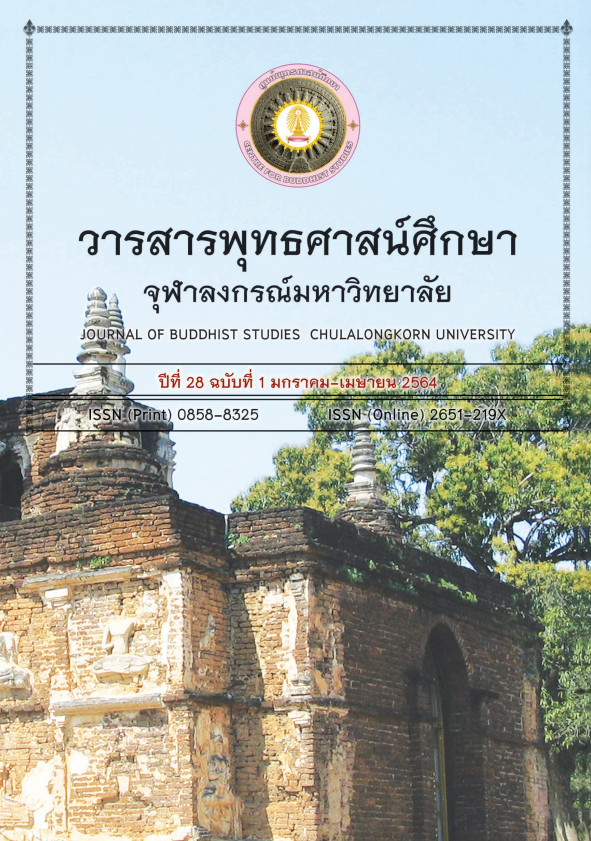An explanation of Ultimate Truth with Language in Theravada Buddhism
Keywords:
Reality, Language, Theravada BuddhistAbstract
In this research, two objectives were purposely made: 1) to study the language in Theravada Buddhism, and 2) to explain the ultimate truth in Theravada Buddhism. This is a qualitative research done by the documentary analysis. In the research, it was obviously found that the language in Theravada Buddhism is presented through words and sentences. By the way, the words were described through the root and history of the word. In addition, they mean the meaning can change always. Although, the sentences which combine a lot of words together make up the meaning though the position of word in these. In the other hand, the sentences must have the subject that is obviously body. Finally, we can know how to use the language explained the ultimate truth with univocal word such as the suffering which not conflict with other meaning. With the sentences explained the ultimate truth, it hadn’t been the body of human but It had been meaning about the abstract thing or nature of things.
Downloads
References
กีรติ บุญเจือ. (2526). ปรัชญาภาษา. กรุงเทพมหานคร: ไทยวัฒนาพานิช.
พระพรหมคุณาภรณ์ (ป.อ.ปยุตฺโต). (2548). พจนานุกรมพุทธศาสตร์ ฉบับประมวลธรรม. พิมพ์ครั้งที่ 13. กรุงเทพมหานคร: บริษัท เอส.อาร์. พริ้นติ้ง แมส โปรดักส์ จำกัด.
พระพรหมคุณาภรณ์ (ป.อ.ปยุตฺโต). (2559). การสื่อภาษาเพื่อเข้าถึงสัจธรรม. พิมพ์ครั้งที่ 8. นครปฐม: วัดญาณเวศกวัน.
พุทธทาสภิกขุ. (2537). ภาษาคนภาษาธรรม. กรุงเทพมหานคร : ธรรมสภา.
มหาจุฬาลงกรณราชวิทยาลัย. (2539). พระไตรปิฎกภาษาไทย ฉบับมหาจุฬาลงกรณราชวิทยาลัย. กรุงเทพมหานคร : โรงพิมพ์มหาจุฬาลงกรณราชวิทยาลัย, ๒๕๓๙.
มหาจุฬาลงกรณราชวิทยาลัย. (2560). อรรถกถาภาษาไทย ฉบับมหาจุฬาลงกรณราชวิทยาลัย.กรุงเทพมหานคร: โรงพิมพ์มหาจุฬาลงกรณราชวิทยาลัย.
สมภาร พรมทา. (2560). พุทธปรัชญาในอภิธรรมปิฎก. นนทบุรี: บริษัท ปัญญฉัตร บุ๊คส์ บายดิ้ง จำกัด.
Bimal Krishna Matilal. (2008). Logic, Language and Reality: Indian Philosophy and Contemporary Issues. 2nd edition. Delhi: Motilal Banarsidass Publishers Private Limited.
Danto, A.C. (1972). Mysticism and Morality. New York: PenGuin Books.
David J. Kalupahana. (1999). The Buddha's Philosophy of Language. Sri Lanka: A Sarvodaya Vishva Lekha Publication.
David J. Kalupahana. (1977). Buddhist Philosophy: A Historical Analysis. 2nd Printing. Honolulu: the University Press of Hawii.
K.N.Jayatilleke. (1975). The Message of the Buddha. ed. by Ninian Smart. London: Allen & Unwin Ltd.
คริสทัล เดวิด. (2563). ภาษา: ถอดรหัสมหัศจรรย์การสื่อสารของมนุษย์. แปลโดย สุนันทา วรรณสินธ์ เบล. กรุงเทพมหานคร: บุ๊คสเคป.
เค.เอ็น.ชยติลเลเก. (2556). พุทธญาณวิทยา (Early Buddhist theory of knowledge). แปลโดย สมหวัง แก้วสุฟอง. กรุงเทพมหานคร: มหาวิทยาลัยมหาจุฬาลงกรณราชวิทยาลัย.
Downloads
Published
How to Cite
Issue
Section
License
บทความที่ได้รับการตีพิมพ์เป็นลิขสิทธิ์ของศูนย์พุทธศาสน์ จุฬาลงกรณ์มหาวิทยาลัย
ข้อความที่ปรากฏในบทความแต่ละเรื่องในวารสารวิชาการเล่มนี้เป็นความคิดเห็นส่วนตัวของผู้เขียนแต่ละท่านไม่เกี่ยวข้องกับศูนย์พุทธศาสน์ จุฬาลงกรณ์มหาวิทยาลัย และคณาจารย์ท่านอื่นๆในมหาวิทยาลัยฯ แต่อย่างใด ความรับผิดชอบองค์ประกอบทั้งหมดของบทความแต่ละเรื่องเป็นของผู้เขียนแต่ละท่าน หากมีความผิดพลาดใดๆ ผู้เขียนแต่ละท่านจะรับผิดชอบบทความของตนเองแต่ผู้เดียว






